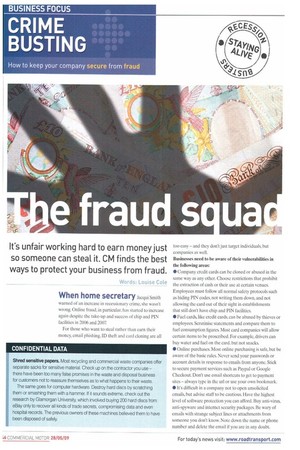e fraud s u
Page 46

Page 47

If you've noticed an error in this article please click here to report it so we can fix it.
It's unfair working hard to earn money just so someone can steal it. CM finds the best ways to protect your business from fraud.
Words: Louise Cote When home secretary „Iacqui Smith warned of an increase in recessionary crime, she wasn't wrong. Online fraud, in particular, has started to increase again despite the take-up and success of chip and PIN facilities in 2006 and 2007 For those who want to steal rather than earn their money, email phishing. ID theft and card cloning are all too easy and they don't just target individuals, but companies as well.
Businesses need to he aware of their vulnerabilities in the following areas: • Company credit cards can be cloned or abused in the same way as any other. Choose restrictions that prohibit the extraction of cash or their use at certain venues. Employees must follow all normal safety protocols such as hiding PIN codes, not writing them down, and not allowing the card out of their sight in establishments that still don't have chip and PIN facilities.
• Fuel cards, like credit cards, can be abused by thieves or employees. Scrutinise statements and compare them to fuel consumption figures. Most card companies will allow certain items to be proscribed. For example, drivers can buy water and fuel on the card, but not snacks.
• Online purchases. Most online purchasing is safe, but be aware of the basic rules. Never send your passwords or account details in response to emails from anyone. Stick to secure payment services such as Paypal or Google Checkout. Don't use email shortcuts to get to payment sites always type in the url or use your own bookmark.
• It's difficult in a company not to open unsolicited emails, but advise staff to be cautious. Have the highest level of software protection you can afford. Buy anti-virus, anti-spyware and intemet security packages. Be wary of emails with strange subject lines or attachments from someone you don't know. Note down the name or phone number and delete the email if you are in any doubt.
Fraud figures for 2008
List year, fraud totalled £610m despite the banking industry stopping huge amounts of transactions. The UK's payments association APACS says: -The main areas of fraud were on transactions not protected by chip and PIN such as internet, phone and mail-order; and fraud abroad use of stolen UK card details in countries yet to upgrade to chip and PIN which has nearly doubled in two years."
The latest APACS figures show card Ill theft losses increased by 39% to £47.4m in one year, with account takeover rife. This is where criminals take over the running of another person's credit or debit card by getting hold of a card and PIN. Online banking fraud losses totalled £52.5m in 2008, a 132% increase from 2007 losses APACS says: "Online banking customers are increasingly being targeted by malware (see right) attacks, which is why the industry continues to remind customers to ensure they have their computers' firewalls switched on and anti-virus software installed and kept up-to-date."
HM Revenue & Customs warns companies, including self-employed people and SMEs, to be aware of a new wave of phishing emails that are promising tax rebates. If you receive any email purporting to he from HMRC however convincingly presented which requests company or financial information by return, delete it and contact the Revenue. It has a list of bogus email addresses and advice on how to deal with them at www.tuurc.gov.uldsectuity/fraud-attempts.htrn.
Phishing einails don't just ask for account details to be sent to the criminal, they are also used for keylogging, whereby a remote PC can track the keys struck on your keyboard and the applications you are using.
Employee fraud
It's one thing to be ripped off by a stranger, but another to have a trusted employee steal from you. White-collar criminals need just three elements, say experts: opportunity; incentive; and the ability to rationalise actions. Think about who you trust, then about how you protect those trusting relationships. Accountability, layers of empowerment and access, and oversight don't just protect the organisation, they protect the individual from suspicion or temptation. Don't allow any person, however trusted, unfettered and unchecked access to your accounts Check one another's budgets and expenditure; have a watertight expenses system where receipts are essential. Prevention is better than disappointment.
Fiddling expenses may be a dismissable misdemeanour and stranger fraud can be referred to the bank but serious theft by an employee is a police matter.
In this instance, you haven't just lost money, relationships and morale take a blow, too.








































































































































